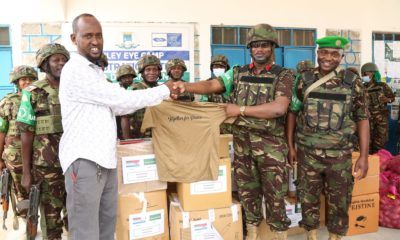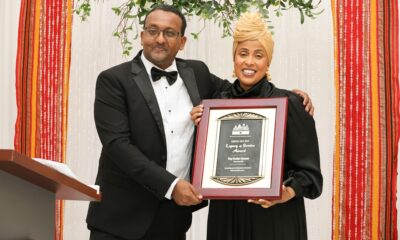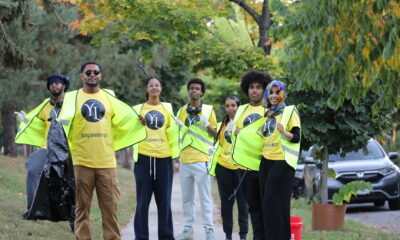Somali News
Mogadishu cautiously celebrates Eid-Ul-Fitr

Mogadishu, 25 May 2020 – Residents of Mogadishu on Saturday marked the end of the holy month of Ramadan by heeding to the advice from health authorities not to gather in large numbers due to the threat of the coronavirus pandemic.

On any other Eid-ul-Fitr day, Mogadishu would be busy with large gatherings and huge celebrations as communities, families and friends come together for what is known as the “Feast of Breaking the Fast”.

This year was different. In his Eid message, the President of Somalia, H.E. Mohamed Abdullahi Farmajoo urged the public to adhere to the health guidelines and celebrate at home.
Very few people were seen at the popular Peace garden and Liido Beach, two of the city’s most populous attractions. Last year, for example, these two places were packed with joyous families and friends celebrating the important national holiday.
While only a few came out this year, security in Mogadishu was tight and those that were up and about on the streets were treated to a fine spectacle.

The highlight was a colourful display by the police brass band locally known as “Koxda Baambayda”, who were in their full white and black regalia and shiny trumpets and flutes. The band marched along the main Makal-Al-Mukarrama road up to the picturesque old town district of Hamarweyne where they performed in honour of staff at the Martini hospital, Somalia’s main COVID-19 treatment centre.
The hospital staff came out for the performance covered from toe to the head in full protective gear. They stood at the main hospital gate to keep their distance from the crowd that had gathered along the street behind the police band which played patriotic tunes that moved everyone.
OUT AND ABOUT
At the Peace Garden in Mogadishu, Deqa Abdi, a mother of five, brought her children to play on the swings and slides. “We came to the Peace garden to enjoy Eid-Ul-Fitr. Although we have to be careful of COVID-19, we could not stop celebrating this joyful day,” Deqa said.

For 32-year-old Ismail Ali Ibrahim, his prayer is that life returns to normal soon.

“I pray to Allah to bring back the joy taken away from us by the coronavirus. Today’s Eid turnout at the mosque and public places in Mogadishu was very low due to fears of the coronavirus as many people remained indoors as advised by the Ministry of Health. I hope next Eid will be more exciting than this,” he said.
Source: AMISOM PUBLIC INFORMATION Photo credit: AMISOM PUBLIC INFORMATION
Health
Attention, Minnesota! Measles Outbreak Alert

Minnesota –
The Minnesota Department of Health (MDH) confirmed measles outbreak. This highly contagious virus can be serious, especially for young children and those with weakened immune systems. Here’s what you need to know:
![]() What is Measles? A viral infection that causes a high fever, cough, runny nose, and a characteristic rash. It can lead to complications like pneumonia and encephalitis.
What is Measles? A viral infection that causes a high fever, cough, runny nose, and a characteristic rash. It can lead to complications like pneumonia and encephalitis.
![]() Symptoms to Watch For: Fever, cough, runny nose, and a red, blotchy rash that typically starts on the face and spreads.
Symptoms to Watch For: Fever, cough, runny nose, and a red, blotchy rash that typically starts on the face and spreads.
![]() Prevention: The best defense is vaccination. Ensure you and your family are up-to-date with the MMR (measles, mumps, and rubella) vaccine. It’s safe and highly effective.
Prevention: The best defense is vaccination. Ensure you and your family are up-to-date with the MMR (measles, mumps, and rubella) vaccine. It’s safe and highly effective.
![]() If You Suspect Infection: Contact your healthcare provider immediately and avoid public places to prevent spreading the virus.
If You Suspect Infection: Contact your healthcare provider immediately and avoid public places to prevent spreading the virus.
Your vigilance can help protect our community. For more information and updates, check with local health authorities and healthcare providers.
Stay safe and informed! https://www.health.state.mn.us/diseases/measles/index.html
Somali News
Severe Drought in the Horn of Africa

Minneapolis, July 20, 2022 –
The Horn of Africa experiences two rainy seasons per year. The timing varies across the region,
but rains broadly fall from March to May. The lack of these rains in 2022 has been felt
particularly in equatorial parts of the Horn of Africa region, where the long rains contribute 70% of the annual total rainfall. Currently, 16.7 million people are projected to be in crisis (UNOCHA) or worse levels of high acute food insecurity solely due to the drought in The Horn of Africa.
Four consecutive rainy seasons have failed since late 2020, a climactic event not seen in the
last 40 years. This disaster is expected to be worse than the famine in 2011, when 260,000
people died in Somalia alone, 50% of those people being children under the age of 5.
Our Executive Director, Mohamed Idris, and Program Director, Jordan Greene, had the
opportunity to visit the Horn of Africa in June 2022. While in The Horn, they were able to witness firsthand the effects of the drought. It became apparent to Idris that the humanitarian situation in the horn of Africa region is alarming.
The latest Intergovernmental Panel on Climate Change report projects that global warming will negatively affect food systems in the region by shortening the growing season and increasing water stress. The combined population of Switzerland and Australia doesn’t add up to the 16.7 million people facing food insecurity in the Horn of Africa. The UNOCHA report further emphasized that the consequences of the prolonged drought conditions have extended to the loss of livestock, with 7 million deaths recorded so far. Another 22 million livestock are estimated to have been severely emaciated due to the drought.
The ongoing humanitarian crisis caused by the drought raises serious questions about future
food and water security in the Horn of Africa. The conditions have increased the workload for
women and female children who are responsible for providing water using donkeys or carrying it on their back; Access to water has increased to a walk between 3 – 5 miles each way. As a
result, female children drop out of school to assist their mothers with this burden.
ARAHA has launched a campaign to support families suffering from this drought. Our teams on the ground in the Horn of Africa allow ARAHA to know what supplies are most needed at this time and respond to the areas in the most need as fast as possible. These supplies include
rice/maize/wheat, cooking oil, evaporated milk, and water. According to our Program Director,
“We are able to distribute food baskets and non-food items for hundreds of drought-affected
families in The Horn of Africa. However, the needs are currently far beyond the resources we
have.”
ARAHA needs donations to continue providing immediate relief and aid to victims of
this disaster. The Executive Director of ARAHA urges donors to think about these families and
support ARAHA’s lifesaving work: “It’s a matter of life and death for these families. Let us save
families before it’s too late. ”
To donate, please visit www.araha.org/donate or text “ARAHA” to 44321.
If you would like more information about ARAHA’s current efforts in The Horn of Africa, please contact Jordan Greene, Program Director (jordan@araha.org), or Ashley Dial, Marketing Director (ashley@araha.org). To learn more about our relief campaign, please visit www.ARAHA.org.
About ARAHA:
ARAHA is a humanitarian non-governmental organization (NGO) that works in the Horn of Africa region, delivering essentials and developing opportunities. We have a diverse range of programs that brings life to our mission and adapts to the specific needs of each community in which it works. The organization aims to bring immediate relief to those in need throughout the Horn while simultaneously seeking to create the conditions for sustainable opportunity and self-reliance. In all programs ARAHA pursues, it seeks to responsibly enact its mission while delivering essentials and developing opportunities in communities across the Horn.
Somali News
ATMIS Donates Medicines and Food items to Dhobley General hospital

Dhobley, 9th July 2022—Troops from the Kenya Defence Forces (KDF) serving under African Union Transition Mission in Somalia (ATMIS), have donated an assortment of medical supplies and food items to Dhobley General Hospital.
ATMIS Deputy Sector Two Commander, Colonel Joel Maiyo, said the food donation was to help with feeding of patients, especially children admitted with severe malnutrition as a result of the ongoing drought. The medical supplies are to help the hospital in meeting the medical needs of patients.
“We came to Dhobley General Hospital to donate medicine and food to support all patients, especially children, women, and the elderly who are admitted to this hospital. Our mandate as ATMIS is to support the Somali people, and this includes supporting the Somali Security Forces in protecting and taking care of welfare of the population. This donation forms part of our civil-military cooperation (CIMIC) activities,” said Col. Maiyo.
Receiving the items, the Director of Dhobley Hospital, Mohamed Yusuf Hassan, called for more support from ATMIS and Somalia’s international partners to help alleviate the suffering of the vulnerable members of the community.
“We appreciate this timely donation, and it must be said that ATMIS has always supported us in times of need. This donation will help alleviate some of the challenges we face. On many occasions, ATMIS has helped us deal with serious medical cases that cannot be treated in our hospitals due to lack of specialist care. We have taken patients to the ATMIS hospital where they have been treated, and we appreciate that very much,” said the hospital director.
Beyond combat activities to degrade Al-Shabaab, ATMIS forces in Somalia undertake Quick Impact Projects, which are small-scale projects that address the basic needs of local populations. Some of the activities include drilling of boreholes, refurbishing hospitals, building schools and markets to help improve the lives and welfare of the local communities living under its areas of responsibility.
ENDS.
SOURCE: ATMIS PUBLIC INFORMATION
-

 Local News8 months ago
Local News8 months agoGovernor Walz Announces Minnesota Ranked as a Top State for Business
-

 Local News5 months ago
Local News5 months agoCelebrating Community: The Inaugural Samafal Gala at the Minnesota Somali Community Center
-

 Community5 months ago
Community5 months agoYouth Leader and Mentor: Mohamed Jama’s Fight for Change in Whittier
-

 Local News4 months ago
Local News4 months agoDuqa magaaladda Minneapolis Jacob Frey ayaa qorsheynaya inuu mar kale isu soo taago doorashada Duqa Magaaladda
-

 Health4 months ago
Health4 months agoE. coli O157 infections linked to consumption of burgers from Twin Cities restaurants
-

 Local News8 months ago
Local News8 months agoSecretary Simon Named President of the National Association of Secretaries of State
-

 Videos5 months ago
Videos5 months agoContracting: Mastering the Basics and Beyond – Nov 13th
-

 Health5 months ago
Health5 months agoEffects of Tobacco on Mental Health

